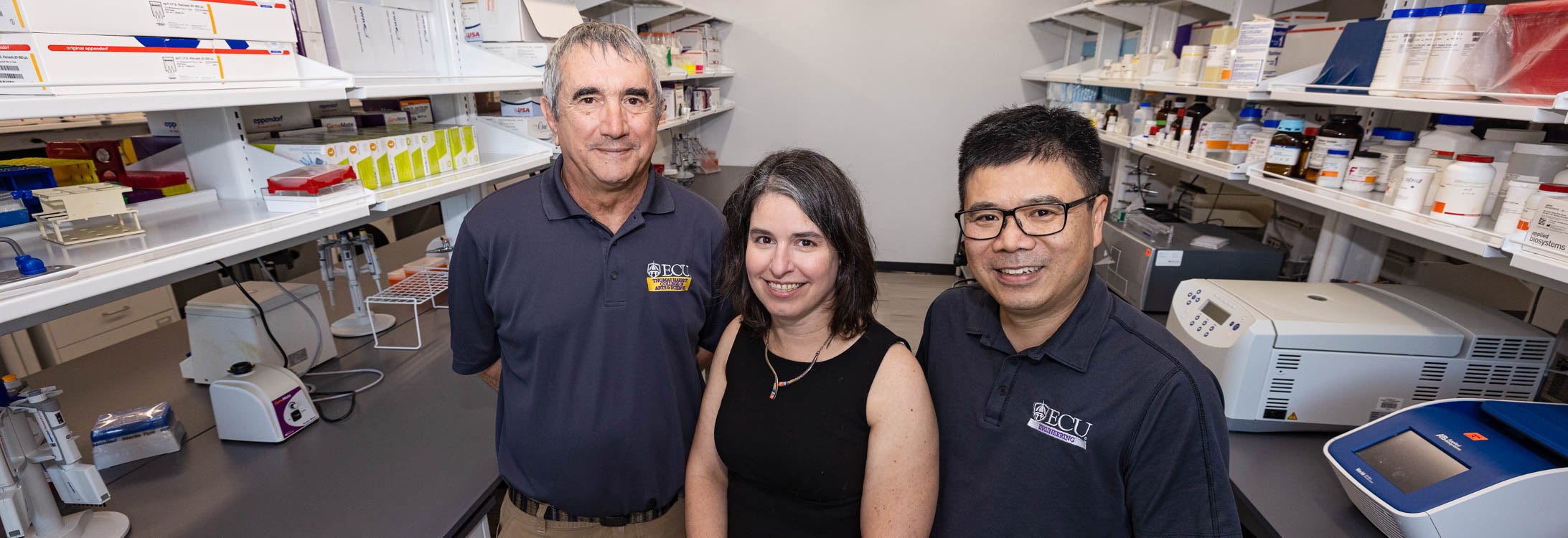RECRUITING STUDENTS TO STEM
ECU collaboration with state universities leads to $3.4M NSF grant
East Carolina University is one of five North Carolina universities collaborating on a $3.4 million, five-year grant from the National Science Foundation to better recruit and support students from underrepresented backgrounds in science, technology, engineering and math (STEM).
Led by UNC-Greensboro, with collaboration from ECU, Appalachian State University, UNC-Wilmington and Western Carolina University, the team is establishing a Louis Stokes Alliance for Minority Participation program (LSAMP), known as the “Mountains to Sea North Carolina Louis Stokes Alliance for Minority Participation program.”
Named in honor of former congressman Louis Stokes, LSAMP is an NSF-funded program at several colleges and universities around the nation. It is known for increasing the success among its participating scholars, many of whom are first-generation college students.

The grant will establish a Louis Stokes Alliance for Minority Participation program at ECU with the goal of helping fill the shortage of work-ready graduates in STEM fields. (ECU file photo)
“We expect LSAMP support to raise participant retention and graduation rates by 20% compared to non-participant students, and indirectly affect many more through LSAMP student support programs that are available to all STEM students,” said Dr. Heather Vance-Chalcraft, ECU project manager and assistant professor of biology in the Thomas Harriot College of Arts and Sciences, who will coordinate ECU’s activities and serve as liaison with UNC-G LSAMP leadership.
ECU will receive a little more than $1 million through the grant, with additional leadership from Dr. Robin Coger, ECU provost and senior vice chancellor for academic affairs, who will ensure institutional support for ECU’s LSAMP activities; Dr. Jean-Luc Scemama, associate professor of biology and associate dean for academic programs in Harriot College, who will facilitate activities for students in biology, chemistry, geological sciences and physics; and Dr. Jason Yao, professor of engineering and associate dean for academic affairs in the College of Engineering and Technology, who will facilitate LSAMP activities for students in engineering and computer science.
“Employment in STEM fields is a fast-growing sector of the U.S. economy and there is often a shortage of eligible applicants for these positions,” Vance-Chalcraft said. “To fill this demand, we need to improve recruitment and retention into STEM fields and broaden participation in science. The LSAMP program will help us engage students from groups that have historically been underrepresented in STEM graduates and create a welcoming environment for all students.”
Yao said, “Many ECU students have a passion for careers in engineering and computer science, but unfortunately they are not necessarily academically prepared for such majors in college. The LSAMP grant will remove these barriers in their pathways to success and make such careers more accessible to the traditionally underrepresented.”
Students at all stages will be eligible for stipends for active participation in ECU’s LSAMP programs. Over the course of the grant, ECU anticipates providing 125 student stipends during the academic year, and 60 summer stipends for participation in scientific research and approved scientific internships. Funding also will be available for student research materials and student travel to professional conferences.
“The stipends available through this LSAMP grant will allow students to participate in valuable research or internship opportunities who may not have been able to do so otherwise. These experiences increase the competitiveness of a student for high quality jobs or graduate programs,” Vance-Chalcraft said.
ECU’s participation in the LSAMP alliance will support underrepresented and minority students in STEM majors through scholarship and activities aimed at improving three key moments in a student’s pathway to success: transitioning from high school to ECU; declaring a STEM major; and transitioning from ECU to a career or graduate education.
Improving student transitions from high school to ECU will include creating a near-peer supplemental instruction and mentoring program for sections of gateway courses in which LSAMP scholars are enrolled.
“Evidence from prior programs indicates that these sessions will decrease the DFW (grades of D, F or withdrawal) rate in these course sections and increase persistence in STEM fields among first- and second-year students,” Vance-Chalcraft said.
Research and internships will help move students from intended STEM majors to declared STEM majors.
“We will include stipends and logistical support for second- to fourth-year LSAMP scholars to participate in research and/or internships,” Vance-Chalcraft said. “These opportunities will help tie students to their major, increasing their likelihood of remaining in their major.”
The transition from ECU to graduate education or the workplace also will be improved through research and internships, and through supplemental graduate education preparation and career preparation through professional development opportunities and conference attendance.
“Finally, we will invite STEM professionals from underrepresented groups to speak with our students,” Vance-Chalcraft said. “This intervention will allow students to see people who look like themselves and have successful STEM careers in industry, research or academia. These activities are intended to increase persistence in STEM fields and improve the transition from ECU to the workplace or graduate school.”
“This is a fantastic time to be in STEM at ECU,” Scemama said. “The LSAMP grant will provide underrepresented students with the skills to succeed academically and become the leaders the industry is looking for.”
